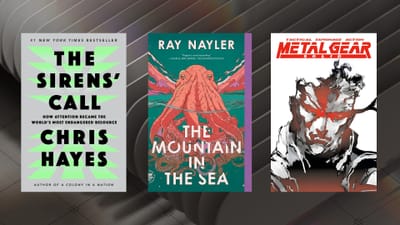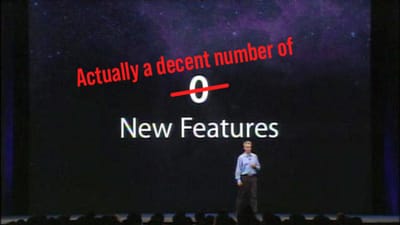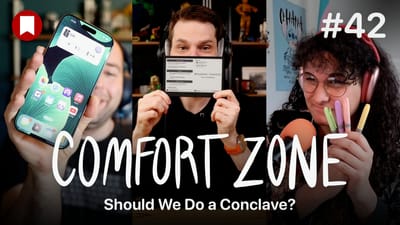Tempering the Free App Outrage
Well, another podcast app has gone free, and with it, the gnashing of teeth has already begun.
Here's how developer Supertop worded the decision it in their announcement:
Yesterday, Supertop needed an endless stream of thousands of new customers to sustain our business. From today, we can be successful with a far smaller number of much happier customers. We can offer better support. We can add new features more often, instead of holding them back for splashy major releases. In other words, we can do the things that indies do best.
There is a lot of frustration out there about "the race to the bottom" in app pricing. Not only is it making the App Store less profitable, they say, but also developers that give their apps away for free are destroying the market for others who want to make an honest buck. The argument being, who would buy a paid app when there are free options available?
I get this argument, and I don't disagree with it in theory. Yes, I understand that developers need to eat and they only get paid if they charge for their work. I fully support Tapbots when they charge for a new version of Tweetbot and I gladly pay for apps that I find interesting. Hell, David Smith gives away most of his apps and I pay the $1-2 IAP even though I don't have to, the apps work just as well without paying a dime.
All that said, there are two things that really bug me about the criticisms we've seen since Overcast 2 went free.
A lot of hate has been directed at Marco Arment, as if he was the first developer to release a free app in a market with paid alternatives. He's not the first to do this, and he's not even the first in the podcasting space. I wrote about this last month when the Marco-hate was at a fever pitch, and argued that the podcast app market was already full of free apps and that the majority of podcast listeners actually use those free apps. Let's not forget that iOS ships with a perfectly good podcast app that's not only free, but already on the hundreds of millions of iPhones out there. What about Stitcher, Podcast Republic, and Podcast Addict, each of which has been downloaded 1-5 million times on Android alone? Google is even getting in on the game by adding podcasts to the built in Google Play Music app.
Meanwhile, other app catagories deal with this too. Reeder has to compete with Feedly, Flipbook, and Newsify. There's even a newsreader called Free RSS App that has almost 20,000 reviews and surely an order of magnitude more downloads. Dark Sky is up against a litany of free weather apps too. I'm not arguing that free apps are an inevitability, I'm just saying that completely free apps exist in every app category you can imagine and I don't fully understand why seemingly nice guy Marco has gotten so much of blame.
Second, I think a lot of people who hate the idea of free apps with non-traditional revenue are a bit idealistic. We can all look back fondly on the days when applications cost $40 and were updated for years, paid updates all along the way. We can look back on the early days of the App Store when it was not unusual for paid apps to be $9.99 and sell incredibly well. The market has been moving down in price over the years, in no small part due to the sheer number of people making and consuming apps. It's a lot easier to charge $9.99 for your app when you're the only game in town, but it gets a lot harder when 20 other developers are making something very similar.
I also wonder how many people actually spend money on paid up front apps. I was talking with a co-worker recently and they said they wished they could have an app that alerted them whenever it was about to rain. "Do I have good news for you!" I said. I showed them Dark Sky on my iPhone and showed them how it solved the exact problem they wanted solved. Once they saw it was $3, they balked and decided to stick with the Yahoo app they already had. To be clear, this was by no means someone who couldn't afford to blow $3 if they didn't like the app, they just had no interest in paying for apps. I think these people are more common than we would like to think. We're the weird ones who spend not-insignificant sums on apps for our phones (searching through my inbox, I see I have spent a little over $100 on apps this year). Yes, great apps can make your phone and life better in a multitude of ways, but many people don't care enough to fork down the dough.
Again, consider when you bought Overcast, Castro, Pocket Casts, or Downcast in the past. There were numerous free podcast apps you could choose, but you went with a paid one because you thought it would be better for your needs. The odds are that every paid app you have on your phone right now has a completely free alternative that you ignored and bought the paid version because you liked it better.
The bottom line is that Marco Arment didn't destroy the podcast app market when he made Overcast free. Nor did Castro going free prove that paid apps are dead at the evil hand of Overcast. These are both developers who are making decisions based on the realities of the market right now. The hard truth is that paid apps just aren't what they used to be. We can wax poetic about the state of the App Store all we want, but it's all an abstract thing to us. It's developers who make their living on the App Store that need to play by the current market rules. If Marco and Supertop saw that it was in their best interest to stay paid, then they would have done that. Both developers surely saw diminishing revenue with their previous models and considered it unsustainable moving forward, which is why they switched strategies.
I'm sure this conversation will continue for quite a while, but my advice in the meantime is to think about what developers you want to support and support them however you can. If you love Overcast, use the patronage feature and throw a few bucks Marco's way. If you love Castro, do the same. Developers do hard work and create amazing tools we all rely on. They deserve to get paid for their work. The specifics on how they get paid is changing, but clinging to market realities that no longer exist isn't going to stop that change,. And pinning this trend on one person is more than a little silly.


